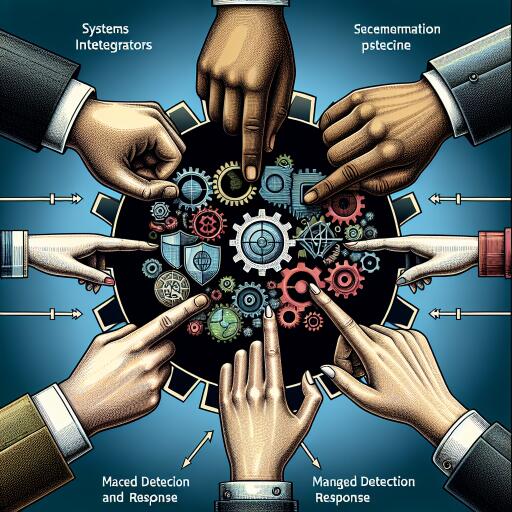Integrating Managed Detection and Response: A Strategic Move for Systems Integrators
In today’s digital era, where the boundaries between physical and digital security realms increasingly blur, systems integrators stand at the frontline of designing, implementing, and upholding sophisticated security measures for corporations across various sectors. With operational technology (OT) environments getting more complex, and cyber threats becoming both more numerous and intricate, the demand for bolstered security capabilities has never been higher. In response, many entities are looking toward Managed Detection and Response (MDR) services as a means to fortify their defenses.
The rising adoption of MDR services is a testament to the critical role they play in the contemporary cybersecurity landscape. Recent insights suggest that by 2025, half of all global organizations will employ MDR services for an array of cybersecurity tasks, with the market valuation expected to hit $2.2 billion. Moreover, organizations employing managed cyber threat detection strategies witness a substantial decrease in security breaches, with a 62% drop in incidents annually, highlighting the efficacy of these services.
For systems integrators, the evolution toward MDR presents a golden opportunity to embed third-party cybersecurity services into their offerings, thereby delivering added value to clients and confirming their position as avant-garde security allies.
Traditional security mechanisms alone, such as firewalls and antivirus programs, are no longer up to the task of safeguarding against contemporary cyber threats. Modern threat actors constantly evolve their techniques to bypass conventional defenses, resulting in the average intruder dwelling within a compromised network for approximately eight to ten days. This scenario underscores the necessity for around-the-clock monitoring, expert threat hunting, and swift incident responses—a feat most organizations struggle to achieve with in-house capabilities alone.
What MDR Brings to the Table
MDR services address these challenges through a variety of specialized activities:
- Advanced Threat Hunting: MDR analysts employ threat intelligence, behavioral analytics, and customized queries to proactively locate and neutralize hidden threats, preventing significant damage or ransom demands.
- Real-time Alert Monitoring: With SOC teams monitoring networks 24/7, MDR services ensure immediate analysis and response to potential threats, minimizing the time attackers spend undetected within environments.
- Accelerated Incident Response: Upon detection, MDR teams quickly contain threats to reduce business disruption, offering expert forensic investigation and malware analysis to aid in recovery and learning from incidents.
MDR providers leverage a wealth of cybersecurity talent and data, utilizing advanced analytical tools and intelligence gathering to keep ahead of threat actors. Their comprehensive services ensure customized and effective threat detection and response strategies for each client, significantly enhancing the overall security posture.
Integration and Implementation by Systems Integrators
For systems integrators, incorporating MDR services into their portfolio is not just about adding another tool; it’s about enriching the security infrastructure with comprehensive, expert-driven services. Leading MDR providers facilitate seamless integration through comprehensive support, including technical documentation, training resources, and dedicated account management. This collaborative approach ensures that systems integrators can effectively deliver MDR services, thus strengthening client relationships and establishing a continuous revenue stream.
By partnering with MDR providers, systems integrators can address the increasingly complex cybersecurity challenges their clients face. This involves evaluating existing security architectures, selecting appropriate MDR partners based on client-specific needs, and managing the ongoing partnership to ensure optimal security outcomes. Through such collaborations, systems integrators can extend beyond their core offerings to deliver enhanced, proactive security solutions, thereby playing a critical role in the modern cybersecurity ecosystem.
In conclusion, as cyber threats continue to evolve in both sophistication and scope, the integration of MDR services into the solutions offered by systems integrators represents a strategic move towards more dynamic, responsive, and effective security measures. This not only enables organizations to better manage and mitigate cyber risks but also positions systems integrators as comprehensive security partners in an increasingly complex digital landscape.










